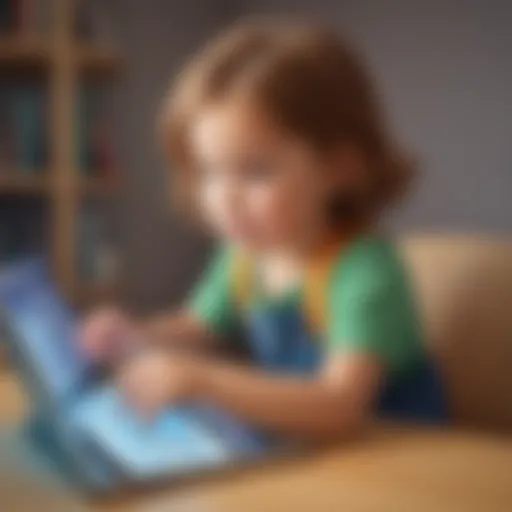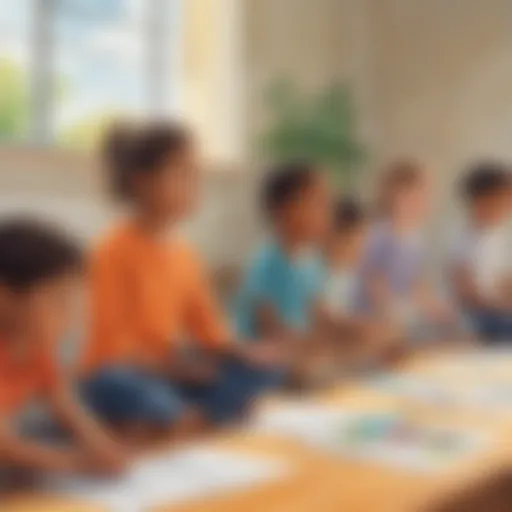Revolutionizing Early Learning: Discovering Science Experiment Kits for Preschoolers
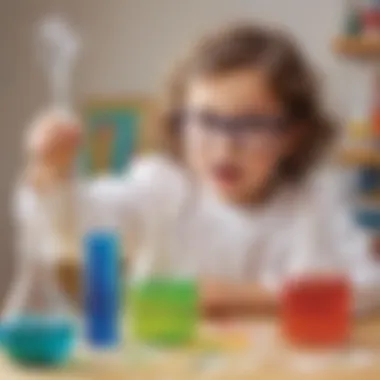

Creative Activities
Within the realm of preschool education, fostering creativity in young minds is paramount. Craft ideas serve as a gateway to imagination and exploration for children at this tender age. By integrating creative craft ideas into their playtime, preschoolers not only enhance their motor skills but also stimulate cognitive development. Simple yet engaging activities like paper weaving, homemade playdough, or nature-inspired art projects can captivate their interest and encourage hands-on learning experiences.
Step-by-Step Guides
Detailed step-by-step instructions are essential in guiding preschoolers through creative activities. Clear and concise directions not only facilitate the crafting process but also promote independence and problem-solving skills. Breaking down each activity into manageable steps ensures that children can follow along easily, fostering a sense of accomplishment. Parents and educators can use these guides as tools to nurture persistence and attention to detail in young learners.
Educational Value
The educational benefits of engaging in creative activities using science experiment kits for preschoolers are manifold. From enhancing fine motor skills to fostering creativity and critical thinking, these activities lay a solid foundation for future academic success. By delving into hands-on projects, children forge connections between theory and practice, cultivating a deeper understanding of scientific concepts at an early age.
Introduction
Preschool education lays the foundation for a child's lifelong learning journey. It is during these formative years that young minds are most receptive to new experiences and knowledge. Science experiment kits tailored for preschoolers play a crucial role in revolutionizing early education by introducing young children to the wonders of science in a hands-on and engaging way. In this section, we will explore the significance of incorporating science experiment kits into preschool curriculums, highlighting how they stimulate curiosity, critical thinking skills, and creativity in young learners.
Importance of Early Science Exploration
Benefits of Introducing Science Early
Engaging children in science from an early age offers a myriad of benefits to their overall development. By exploring scientific concepts through interactive experiments, children develop a natural curiosity about the world around them. This early exposure not only nurtures a love for learning but also enhances problem-solving skills and concentration levels. Introducing science early sets a strong educational foundation for preschoolers, fostering a methodical approach to understanding the principles that govern the natural world.
Encouraging Critical Thinking Skills
Encouraging critical thinking skills in preschoolers is essential for their cognitive growth. Science experiment kits stimulate analytical thinking and logical reasoning in children. By posing questions, encouraging hypothesis formation, and guiding children through the scientific method, these kits empower young minds to approach challenges systematically. The ability to think critically from a young age equips children with valuable skills that are integral to success in their academic and personal pursuits.
Fostering Curiosity and Creativity
Fostering curiosity and creativity in preschoolers through early science exploration is crucial for igniting a passion for discovery. Science experiment kits provide a platform for children to ask questions, experiment, and draw their conclusions. This process of inquiry-based learning not only nurtures curiosity but also sparks creativity as children find innovative ways to engage with scientific concepts. By fostering a sense of wonder and exploration, these kits inspire a lifelong love for learning and inquiry.
Overview of Science Experiment Kits
Science experiment kits are meticulously designed to introduce young learners to various scientific principles in a safe and engaging environment. These kits typically come with a range of age-appropriate materials and activities tailored to capture the interest of preschoolers. They focus on hands-on experiences that make scientific concepts accessible and fun for children, promoting a sense of discovery and exploration from an early age.
Purpose and Scope of Science Kits
The primary purpose of science experiment kits is to make science accessible and enjoyable for preschoolers. These kits aim to demystify complex scientific concepts by presenting them in a simple and interactive manner. By providing hands-on experiments and activities, science kits allow children to explore and understand fundamental scientific principles through direct experience. The scope of these kits extends beyond rote learning, emphasizing practical application and intuitive understanding.
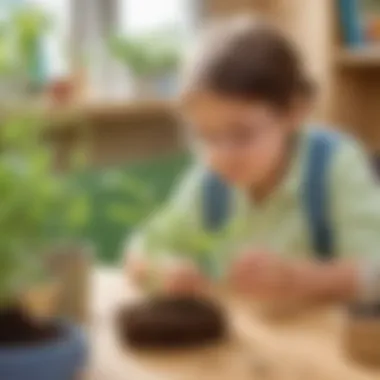

Age-Appropriate Materials and Activities
Age-appropriate materials and activities are integral to the effectiveness of science experiment kits for preschoolers. These kits are tailored to suit the developmental stage of young children, ensuring that the tasks and materials are engaging yet manageable. By using materials that are safe, durable, and conducive to exploration, science kits create a supportive environment for children to learn and play. The activities included in these kits are designed to stimulate young minds, promoting active participation and knowledge retention.
Choosing the Right Kit
Selecting the appropriate science experiment kit for preschoolers is a critical decision. The choice of kit can have a profound impact on a child's early development, shaping their understanding of scientific concepts and nurturing their curiosity. By carefully considering factors such as educational objectives, safety precautions, and engagement level, parents and educators can ensure that the chosen kit aligns with the child's learning needs and promotes a positive learning experience. A well-chosen kit can foster a love for learning and encourage critical thinking skills from a young age.
Factors to Consider
Educational Objectives
Educational objectives play a crucial role in guiding the learning process for preschoolers. These objectives define the goals and outcomes of the educational experience, helping to structure activities and content in a way that enhances the child's cognitive development. When choosing a science experiment kit, it is essential to consider the educational objectives it aims to achieve. Look for kits that focus on hands-on learning, problem-solving skills, and basic scientific principles to ensure a well-rounded educational experience for the child.
Safety Precautions
Safety precautions are paramount when selecting a science experiment kit for preschoolers. Ensuring the safety of young learners during hands-on experiments is non-negotiable. The chosen kit should include clear safety guidelines, age-appropriate materials, and protective gear to minimize any risks. Parents and educators must prioritize safety when choosing a kit, as it sets the foundation for a secure and enriching learning environment.
Engagement Level
The engagement level of a science experiment kit determines its effectiveness in capturing a child's interest and sustaining their curiosity. Interactive and stimulating activities within the kit can keep preschoolers engaged and excited about learning. Consider opting for kits that offer a variety of experimentation opportunities, challenges, and multsensory experiences to ensure continuous engagement. A high engagement level not only enhances the child's learning experience but also contributes to long-term knowledge retention.
Popular Science Kit Brands
Learning Resources
Learning Resources is a renowned brand known for its high-quality educational products tailored for young learners. Their science experiment kits are designed to promote hands-on exploration and critical thinking skills in preschoolers. With a focus on interactive learning experiences, Learning Resources kits offer a diverse range of activities that cater to different learning styles and interests.
Thames & Kosmos
Thames & Kosmos is a leading provider of science kits that combine fun and learning seamlessly. Their kits feature innovative experiments and projects that introduce preschoolers to fundamental scientific principles in an engaging way. With a strong emphasis on child development and educational value, Thames & Kosmos kits are a popular choice among parents and educators seeking to instill a love for science in young minds.
Melissa & Doug
Melissa & Doug, a trusted name in children's toys and activities, also offers a range of science experiment kits for preschoolers. Their kits focus on hands-on learning, imaginative play, and skill development, making them ideal for fostering creativity and exploration in young children. Melissa & Doug kits prioritize both fun and educational content, striking a balance that appeals to both kids and adults alike.
Setting Up the Experiment
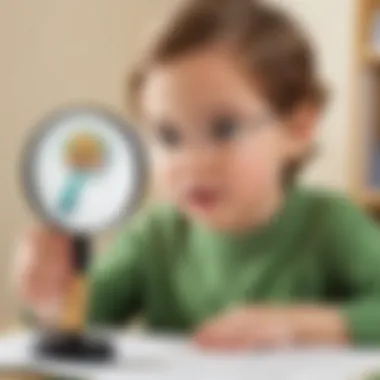

Setting up the experiment is a crucial step within the realm of preschool science education. It sets the foundation for hands-on learning experiences that foster curiosity and critical thinking in young children. By creating a safe and conducive environment for scientific exploration, parents and educators can effectively engage preschoolers in the wonders of science. The process of setting up an experiment involves meticulous planning, selecting appropriate materials, and ensuring safety measures are in place to prevent any potential hazards.
Preparing the Environment
Safety Measures
Safety measures play a vital role in setting up preschool science experiments. Ensuring a child-proof environment by securing fragile items, covering electrical outlets, and storing hazardous substances out of reach is imperative. Implementing safety protocols, such as wearing protective gear when necessary and supervising closely during experiments, reduces the risks associated with hands-on activities. Parents and caregivers should prioritize safety to create a worry-free learning space where children can explore scientific concepts without concerns about accidents.
Clear Instructions
Clear and concise instructions are essential for guiding preschoolers through science experiments. Using simple language, visual aids, and step-by-step directions help children understand the procedures and concepts involved in each activity. Well-defined instructions not only facilitate the experiment but also promote independent learning and problem-solving skills in young learners. Clarity in instructions minimizes confusion and increases engagement, enabling children to derive maximum educational benefit from each science kit experience.
Engaging with Your Child
Encouraging Exploration
Encouraging exploration ignites a sense of wonder and inquiry in preschoolers. By allowing children to explore materials freely, pose questions, and make discoveries, parents and educators nurture a scientific mindset from an early age. This hands-on approach promotes experimentation, hypothesis testing, and creativity, fostering a deeper appreciation for the scientific process. Encouraging exploration empowers children to think critically and approach challenges with confidence, laying the groundwork for future academic success.
Facilitating Learning
Facilitating learning involves guiding children through scientific concepts and encouraging meaningful interactions with the materials. Prompting discussions, asking open-ended questions, and relating experiments to real-world phenomena enhance comprehension and retention. Facilitators play a crucial role in scaffolding learning experiences, providing support while allowing children to explore independently. By fostering a collaborative learning environment, caregivers ensure that preschoolers not only grasp scientific principles but also develop a lifelong passion for discovery and knowledge.
Exploring Science Concepts
In an attempt to delve into the intricate world of early childhood education, it becomes evident that exploring science concepts holds a paramount position in shaping young minds. By introducing preschoolers to fundamental scientific principles and fostering a spirit of inquiry, we lay down a solid educational foundation that goes beyond mere theoretical teachings. Through hands-on experimentation, children not only grasp abstract concepts but also develop essential problem-solving skills. The significance of exploring science concepts lies in its ability to spark curiosity and cultivate a genuine interest in the natural world, providing young learners with a unique avenue for exploration and discovery.
Hands-On Learning
Experiments and Observations
The realm of experiments and observations plays a crucial role in the pedagogical journey of preschoolers. By engaging in hands-on activities, children not only enhance their cognitive abilities but also sharpen their observational skills. Experiments and observations offer a tangible way for youngsters to interact with scientific phenomena, fostering a sense of wonder and curiosity. One key characteristic of experiments and observations is their ability to stimulate empirical thinking, allowing children to make connections between theory and practice. This active learning approach not only consolidates theoretical knowledge but also instills a sense of scientific inquiry at an early age.
Understanding Basic Scientific Principles
Understanding basic scientific principles forms the foundation upon which scientific inquiry thrives in young minds. By grasping the fundamental principles governing the natural world, children acquire a framework for interpreting and analyzing various scientific phenomena. This aspect of science education equips preschoolers with essential analytical skills, enabling them to deconstruct complex concepts into manageable components. One distinctive feature of understanding basic scientific principles is its emphasis on critical thinking and logical reasoning. By encouraging children to seek explanations and apply logical reasoning, this facet of science education nurtures a capacity for structured problem-solving and scientific inquiry.
Encouraging Questions and Reflection
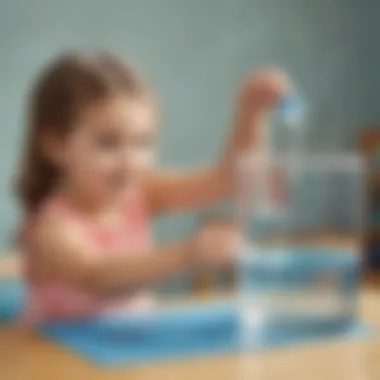

Promoting Inquiry-Based Learning
At the core of inquiry-based learning lies the promotion of curiosity and self-directed exploration. By encouraging preschoolers to ask questions and seek answers through investigation, we cultivate a deep-seated curiosity that transcends rote learning. Promoting inquiry-based learning empowers children to take ownership of their educational journey, instilling in them a sense of autonomy and intellectual agency. One pivotal characteristic of inquiry-based learning is its emphasis on process over product, wherein learning becomes a dynamic and iterative process of exploration and discovery.
Stimulating Critical Thinking
Stimulating critical thinking in young learners nurtures a mindset of analytical rigor and logical reasoning. By presenting challenges that require deep thought and careful evaluation, we push children to expand their cognitive capacities and approach problems from multiple perspectives. Critical thinking instills in preschoolers a habit of mind that values evidence-based reasoning and informed decision-making. One key advantage of stimulating critical thinking is its overarching impact on a child's ability to navigate complex situations, analyze information critically, and make informed judgments.
Benefits of Science Kits
Science kits play a pivotal role in shaping the cognitive development and personal growth of preschoolers. The infusion of hands-on experimentation and observation through these kits serves as a cornerstone in enhancing problem-solving skills and improving concentration. By engaging young children in interactive scientific activities, science kits foster a deep sense of curiosity and ignite a passion for learning from an early age. The benefits go beyond surface-level engagement, delving into the realms of cognitive enhancement and character development. Parents and educators can witness the transformative impact of science kits as they witness their little ones navigate through problem-solving challenges with inquisitive minds and heightened concentration.
Cognitive Development
Enhancing Problem-Solving Skills
One of the fundamental aspects of cognitive development in preschoolers is the enhancement of problem-solving skills. Through science experiment kits, children are exposed to situations that require critical thinking, logical reasoning, and creative solutions. This process not only sharpens their analytical abilities but also nurtures a mindset that is resilient to challenges. Problem-solving skills enable young learners to approach obstacles with confidence and perseverance, laying a strong foundation for future academic and real-world scenarios. The integration of problem-solving activities within science kits equips children with the essential toolkit to navigate complexities with a systematic and strategic approach.
Improving Concentration
Another crucial facet of cognitive development facilitated by science kits is the improvement in concentration levels. As children engage in hands-on experiments and exploratory tasks, they develop the ability to focus their attention for sustained periods. The interactive nature of these activities captures their interest, encouraging deep concentration and attentiveness. Improved concentration not only enhances learning outcomes but also cultivates a sense of discipline and presence of mind. Preschoolers who are exposed to structured science experiments tend to exhibit greater levels of focus in various settings, translating into heightened academic performance and self-regulation skills.
Personal Growth
Boosting Confidence
Science kits contribute significantly to the personal growth of preschoolers by boosting their confidence levels. Through successful completion of experiments and hands-on activities, children experience a sense of accomplishment and self-efficacy. This boost in confidence not only empowers them to tackle new challenges but also instills a belief in their problem-solving abilities. Confidence serves as a catalyst for overall development, influencing how children approach tasks and interact with their surroundings. The nurturing environment provided by science kits fosters a growth mindset, where preschoolers perceive setbacks as opportunities for learning and growth.
Instilling a Love for Learning
An invaluable aspect of personal growth instigated by science experiment kits is the instillation of a profound love for learning. These kits create a dynamic learning environment that transcends traditional classroom settings, where children are encouraged to explore, question, and discover at their own pace. The emphasis on hands-on experiences cultivates a lifelong passion for seeking knowledge and understanding the world around them. By nurturing a love for learning from an early age, science kits lay the groundwork for continuous intellectual development and a positive attitude towards education.
Conclusion
In navigating the realm of early childhood education, a pivotal aspect that demands recognition is the essence of the conclusion. This concluding segment serves as the culmination of a journey through the intricacies of revolutionizing preschool education via science experiment kits for preschoolers. It encapsulates the core essence and significance of the entire discourse, shedding light upon the transformative impact these kits can have on young, inquisitive minds. Through a careful examination of the benefits, considerations, and practical implications of this exploration, the conclusion plays a vital role in instilling a holistic understanding and appreciation for the vital role science plays in the developmental landscape of preschoolers.
Nurturing Young Scientists
Empowering Preschoolers through Science
Delving into the realm of empowering preschoolers through science beckons us to acknowledge the intrinsic power a scientific approach holds in shaping young minds. By immersing preschoolers in the world of scientific exploration, we pave the way for a profound transformation in their cognitive and intellectual development. The key characteristic that defines this empowerment is the fostering of a sense of curiosity, instigating a thirst for knowledge that transcends mere memorization. Empowering preschoolers through science emerges as a transformative choice for this article due to its ability to spark a genuine interest in the scientific domain, laying a strong foundation for future academic pursuits. The unique feature of this approach lies in its capacity to blend entertainment with education seamlessly, making learning an engaging and enjoyable experience. Its advantages are rooted in promoting critical thinking, problem-solving skills, and igniting a passion for discovery, all of which are paramount for the holistic growth of preschoolers.
Encouraging Lifelong Learning
The notion of encouraging lifelong learning underscores a fundamental pillar in the educational journey of young minds. By fostering a spirit of continuous exploration and growth, we impart invaluable lessons that extend far beyond the confines of a traditional classroom setting. At the heart of this endeavor lies the key characteristic of cultivating a growth mindset, instilling in preschoolers the belief that every challenge is an opportunity for learning and improvement. Encouraging lifelong learning emerges as a prominent choice for this article due to its potential to lay a strong educational foundation that transcends the preschool years, nurturing a lifelong thirst for knowledge and understanding. The unique feature of this approach lies in its holistic approach to education, promoting not just academic excellence but also emotional intelligence, resilience, and adaptability. Its advantages manifest in shaping individuals who are curious, resilient, and equipped to navigate the complexities of an ever-evolving world, preparing them for success in both academic and personal spheres.

